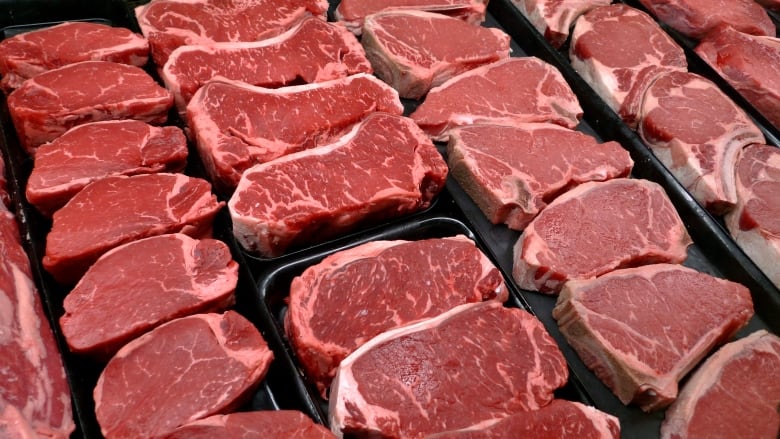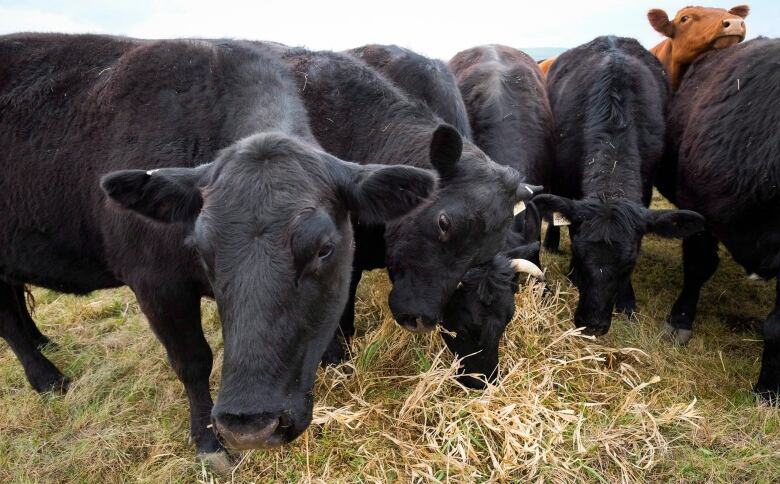U.S. bid to resurrect contentious beef labelling rules returns to Capitol Hill
U.S. bill seeks return of country-of-origin rules once repealed under threat of Canadian trade sanctions

A group of U.S. senators is aimingtobring back mandatory country-of-origin labelling rules for beef,six years after being repealed under the threat of $1-billion in trade sanctionsfrom Canada.
Four U.S. senators two Republican and two Democrat recentlyintroducedtheAmerican Beef Labeling Act, garnering praise from long-time backers who see the rules as helping struggling ranchers.
"We intend to get this passed as quickly as possible," said Bill Bullard, chief executive of R-CALF USA,a cattle trade association representing about 5,500 farmers and ranchers across 44 states.
Opponentsof the bill, in Canada and the United States, regard theproposed legislation as a long shot but are nevertheless keeping close tabs due to thehigh stakes and unpredictability ofpolitics inside the Beltway.
The annual value of Canadianexports of beef and live cattle to the U.S. is pegged at between $2.5 billion and $3 billion.
"We're watching you never know," said Bob Lowe, president of the Canadian Cattlemen's Association.
"It's the world of politics, and sometimes there doesn't need to be a reason."

When the U.S. wielded mandatory country-of-origin labellingrules (MCOOL)last decade, it cost Canadianproducers dearlyand wasblamedfor sharp declines in livestockexports south of the border.
It set mandatory labelling for packaged steaks and other cuts of meat, requiring grocery stickers explaining where livestock was born, raised and slaughtered. Opponents saw the rules as protectionist.
Ultimately, it took the World Trade Organization, which ruled that the U.S. violated international trade law, and the threat ofhefty sanctionsfor Americanlawmakers to repeal the regulationsin 2015.
Now,a group of American senators aim to bring it back.
Sen. John Thuneof South Dakota said their bill wouldrequire the U.S. Trade Representative to develop a WTO-compliant means of reinstating MCOOL for beef within one year of enactment.
The bill also proposes that ifthe trade representativefailsto do so within ayear of enactment, then MCOOLwould automatically be reinstated for beef.
"Transparency in labelling benefits both producers and consumers," said Thunein a release.
"Unfortunately, the current beef labelling system in this country allows imported beef that is neither born nor raised in the United States, but simply finished here, to be labelled as a product of the USA."
The bill, introduced last month, still faces a political labyrinth ahead of it, andhasbeen referred to the Senate's committee on agriculture, nutritionand forestry.

Still, R-CALF's Bullard is certain itwill have success,adding "both sides of the aisle can see that the marketplace in the United States is fundamentally broken for the cattle and beef industries."
But the oldest and largest national association representing U.S. cattle producers continues to oppose MCOOL.
"I would say it's a billion-dollar gamble,"said Kent Bacus,a senior director at the National Cattlemen's Beef Association.
"If we are unable to find a trade compliant solution, then we're going to have to fight it out in the WTO. And meanwhile, Canada and Mexico will probably move forward with retaliation as they are entitled under the WTO decision."
Bacus saidthe policy would hurtAmerican producers as well, "because we export a lot of live cattle to Canada."
Lowe of the Canadian Cattlemen's Association said he doesn't believe the bill will pass because of the retaliatory tariffs the U.S. would face from Canada under the WTO ruling.

"Someday, something probably will move forward,but we don't think this [bill]is the one," Lowesaid.
A spokeswoman for Global Affairs Canada said Ottawa would oppose any new proposals from the U.S. to resurrect mandatory country-of-origin labelling for beef and pork.
"We expect the U.S. to continue abiding to this ruling and its WTO obligations,"Lama Khodr said in an email.
One trade expert said the issue is another reminderwhy it'simportant tobuildrelationships with state legislators who can also be allies on trade issues between the two countries.
"I hate to be worried about this stuff, but we've got to be on this likestink on you-know-what," said Carlo Dade, director of the trade andinvestment centre at the Canada West Foundation.
"The easiest problem to solve is one that you prevent from becoming a problem. So even if this doesn't go anywhere, the work to make sure it doesn't go anywhere would pay dividends."












_(720p).jpg)


 OFFICIAL HD MUSIC VIDEO.jpg)
.jpg)



























































































